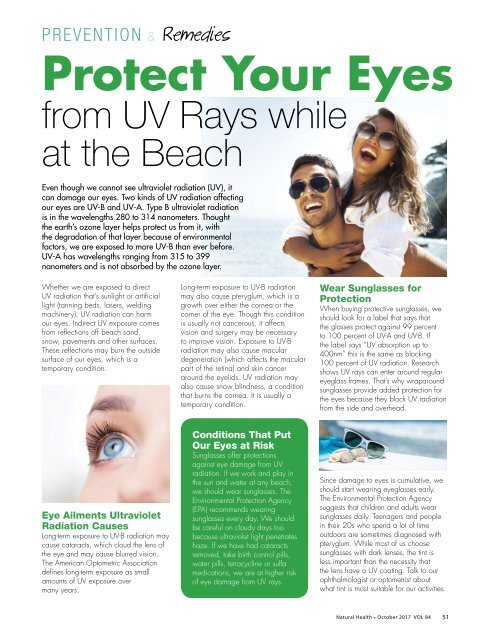Natural Health October 2017
Create successful ePaper yourself
Turn your PDF publications into a flip-book with our unique Google optimized e-Paper software.
PREVENTION & Remedies<br />
Protect Your Eyes<br />
from UV Rays while<br />
at the Beach<br />
Even though we cannot see ultraviolet radiation (UV), it<br />
can damage our eyes. Two kinds of UV radiation affecting<br />
our eyes are UV-B and UV-A. Type B ultraviolet radiation<br />
is in the wavelengths 280 to 314 nanometers. Thought<br />
the earth’s ozone layer helps protect us from it, with<br />
the degradation of that layer because of environmental<br />
factors, we are exposed to more UV-B than ever before.<br />
UV-A has wavelengths ranging from 315 to 399<br />
nanometers and is not absorbed by the ozone layer.<br />
Whether we are exposed to direct<br />
UV radiation that’s sunlight or artificial<br />
light (tanning beds, lasers, welding<br />
machinery), UV radiation can harm<br />
our eyes. Indirect UV exposure comes<br />
from reflections off beach sand,<br />
snow, pavements and other surfaces.<br />
These reflections may burn the outside<br />
surface of our eyes, which is a<br />
temporary condition.<br />
Long-term exposure to UV-B radiation<br />
may also cause pteryglum, which is a<br />
growth over either the cornea or the<br />
corner of the eye. Though this condition<br />
is usually not cancerous, it affects<br />
vision and surgery may be necessary<br />
to improve vision. Exposure to UV-B<br />
radiation may also cause macular<br />
degeneration (which affects the macular<br />
part of the retina) and skin cancer<br />
around the eyelids. UV radiation may<br />
also cause snow blindness, a condition<br />
that burns the cornea. It is usually a<br />
temporary condition.<br />
Wear Sunglasses for<br />
Protection<br />
When buying protective sunglasses, we<br />
should look for a label that says that<br />
the glasses protect against 99 percent<br />
to 100 percent of UV-A and UV-B. If<br />
the label says “UV absorption up to<br />
400nm” this is the same as blocking<br />
100 percent of UV radiation. Research<br />
shows UV rays can enter around regular<br />
eyeglass frames. That’s why wraparound<br />
sunglasses provide added protection for<br />
the eyes because they block UV radiation<br />
from the side and overhead.<br />
Eye Ailments Ultraviolet<br />
Radiation Causes<br />
Long-term exposure to UV-B radiation may<br />
cause cataracts, which cloud the lens of<br />
the eye and may cause blurred vision.<br />
The American Optometric Association<br />
defines long-term exposure as small<br />
amounts of UV exposure over<br />
many years.<br />
Conditions That Put<br />
Our Eyes at Risk<br />
Sunglasses offer protections<br />
against eye damage from UV<br />
radiation. If we work and play in<br />
the sun and water at any beach,<br />
we should wear sunglasses. The<br />
Environmental Protection Agency<br />
(EPA) recommends wearing<br />
sunglasses every day. We should<br />
be careful on cloudy days too<br />
because ultraviolet light penetrates<br />
haze. If we have had cataracts<br />
removed, take birth control pills,<br />
water pills, tetracycline or sulfa<br />
medications, we are at higher risk<br />
of eye damage from UV rays.<br />
Since damage to eyes is cumulative, we<br />
should start wearing eyeglasses early.<br />
The Environmental Protection Agency<br />
suggests that children and adults wear<br />
sunglasses daily. Teenagers and people<br />
in their 20s who spend a lot of time<br />
outdoors are sometimes diagnosed with<br />
pteryglum. While most of us choose<br />
sunglasses with dark lenses, the tint is<br />
less important than the necessity that<br />
the lens have a UV coating. Talk to our<br />
ophthalmologist or optometrist about<br />
what tint is most suitable for our activities.<br />
<strong>Natural</strong> <strong>Health</strong> * <strong>October</strong> <strong>2017</strong> VOL 84<br />
51

















